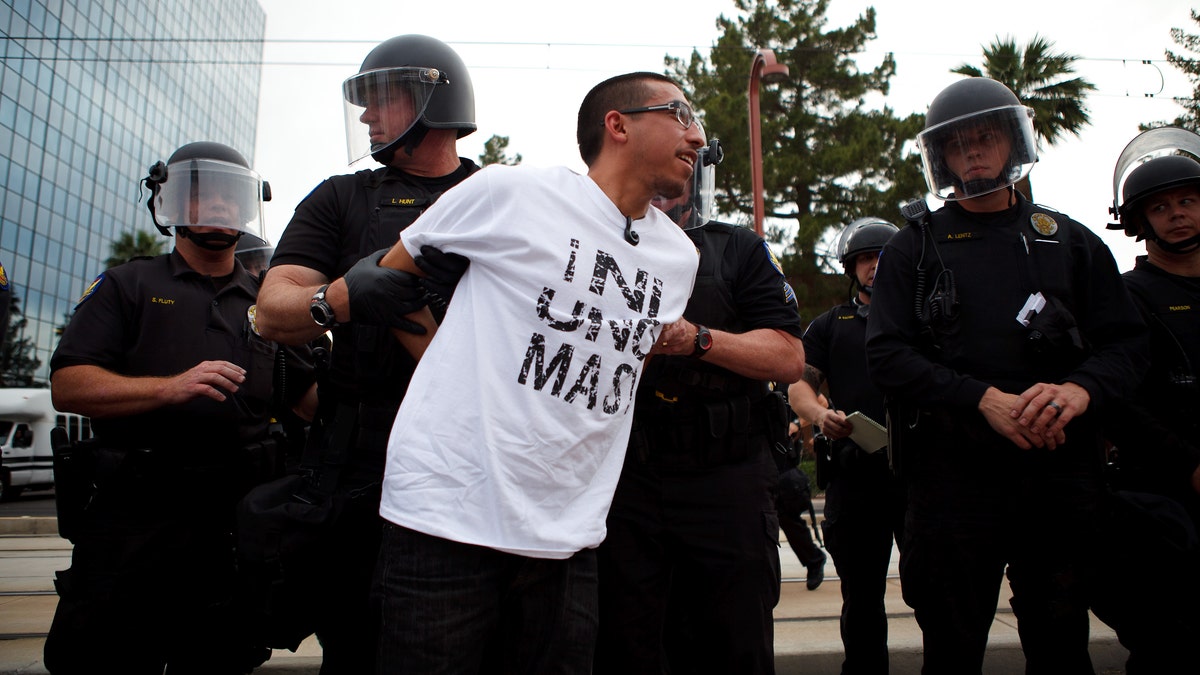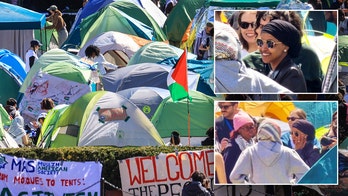
A protester opposed to SB 1070 is taken into custody by police officers April 25, 2012 in Phoenix, Arizona. (Photo by Jonathan Gibby/Getty Images) (2012 by Getty Images)
Washington, D.C. – U.S. Department of Homeland Security officials say the U.S. Supreme Court's decision upholding the provision that allows police to check immigration papers of suspected undocumented immigrants will not change the agency's focus on criminals and suspected terrorists.
To address any possible confusion among its officers in Arizona, DHS officials plan to issue directives to its staff there reiterating its policy change last year calling for enforcement to prioritize criminals and people deemed threats to national security over immigrants who have just civil violations.
“I am pleased that the U.S. Supreme Court confirmed that state laws cannot dictate the federal government’s immigration enforcement policies or priorities," said Homeland Security Secretary Janet Napolitano in a statement released Monday afternoon. "DHS remains focused on enhancing public safety and the integrity of our border by prioritizing enforcement resources on those who are in the country unlawfully and committing crimes, those who have repeatedly violated our immigration laws, and those who recently crossed our borders illegally."
DHS officials are expressing concern over a possible deluge of telephone calls from local police checking on the immigration status of people they suspect are in the country illegally. Arizona's law allows people to sue officials they believe are not upholding the immigration law.
"The Court’s decision not to strike down Section Two at this time will make DHS’ work more challenging," said Napolitano, who was governor of Arizona. "Accordingly, DHS will implement operational enhancements to its programs in Arizona to ensure that the agency can remain focused on its priorities."
The Court’s decision not to strike down Section Two at this time will make DHS’ work more challenging.
SB 1070 has divided law enforcement officials, some of whom support it and others who say it will make their job more difficult.
“There is a body of case law defining what constitutes reasonable suspicion in other contexts, but no such guidance exists regarding illegal immigrants, and SB 1070 does not define the term,” said Tucson Police Chief Roberto Villasenor in a statement.“Under the Supreme Court decision, police departments in Arizona must enforce Section 2(B), and no one respects the authority of the courts more than police chiefs, so we will do our best to enforce the law. But we are in uncharted territory on this issue.”
"The difficulty in enforcing Section 2(B) is compounded by its provisions allowing anyone to sue the police for failing to enforce the law," Villasenor said. "So police and sheriffs’ departments in Arizona may be sued by people who believe they are not aggressive enough in enforcing the law—or by others who believe that police are being too aggressive or are engaging in racial profiling."
"We absolutely expect lawsuits on both sides of this issue,” Villasenor said. “This will result in our officers being tied up in court rather than working on the streets to reduce crime.”
Immigration officials say that while they will check the immigration status of a person arrested when a police officer contacts them for that information, they will not then take custody of the person and move to deport them if that person does not fit a "high priority" category.
The Obama Administration announced a change in deportation policy last year after growing criticism by immigration advocates and civil rights groups over the record number of deportations under Obama. An average of 400,000 people have been deported each year.
Polls of Latino voters, seen as a crucial group in this year's presidential election, show that while they do not consider immigration a primary day-to-day concern, they disapprove of Obama's aggressive deportation policy.
Arizona officials who have supported SB 1070 generally have not seen mass deportations of people in their state unlawfully as a consequence of the measure. Rather, they have seen SB 1070 as a deterrent for illegal immigration. In many areas of Arizona, as well as other states that have similar laws, undocumented immigrants have left -- either to other states that don't have immigration laws, or to their home countries.
In its highly anticipated decision Monday, the Supreme Court threw out three of four key provisions of Arizona's crackdown on undocumented immigrants, but left the intensely controversial portion that requires police to check the status of people stopped for various reasons who might appear to be in the U.S. illegally.
The court upheld the "show me your papers" requirement, but even there the justices said the provision could be subject to additional legal challenges. And they removed some teeth by prohibiting officers from arresting people solely on immigration charges.
The Obama administration had assailed the Arizona law as an unconstitutional intrusion into an area under Washington's control, and the court struck down provisions that would have made state crimes out of federal immigration violations.
But several lawmakers and civil rights groups said the part of the law left in place by the High Court was an invitation to profiling.
The decision on SB 1070, which threw into sharp relief the frustration of many state officials over federal inaction on illegal immigration, comes at a time when illegal immigration has declined.
The Pew Hispanic Center’s March 2009 estimate of roughly 11 million undocumented immigrants in the country represented the first reversal in the size of that population in two decades.
There were 3.5 million unauthorized immigrants living in the United States in 1990, a number that grew to 8.4 million in 2000. The population leveled off for two years and grew steadily from 2003 to 2007, when it peaked at 12 million. From 2007 to 2009, it shrank by 8 percent.
The Arizona decision landed in the middle of a presidential campaign in which Obama has been heavily courting Latino voters and Republican challenger Mitt Romney has been struggling to win Latino support. During a drawn-out primary campaign, Romney and the other GOP candidates mostly embraced a hard line on undocumented immigrants, though Romney has lately taken a softer tone.
In Monday’s decision, the court was unanimous on allowing the immigration status check to go forward. The justices were divided on striking down the other portions.
Justice Anthony Kennedy said the law could — and suggested it should — be read to avoid concerns that status checks could lead to prolonged detention.
The court struck down these three major provisions: requiring all immigrants to obtain or carry immigration registration papers, making it a state criminal offense for an undocumented immigrant to seek work or hold a job and allowing police to arrest suspected undocumented immigrants without warrants.
Arizona Gov. Jan Brewer said the ruling marked a victory for people who believe in the responsibility of states to defend their residents. The case, she said, "has always been about our support for the rule of law. That means every law, including those against both illegal immigration and racial profiling. Law enforcement will be held accountable should this statute be misused in a fashion that violates an individual’s civil rights."
Civil rights groups that separately challenged the law over concerns that it would lead to rights abuses said their lawsuit would go on.
Even with the limitations the High Court put on Arizona, the immigration status check still is "an invitation to racial profiling," said American Civil Liberties Union lawyer Omar Jadwat.
The Obama administration sued to block the Arizona law soon after its enactment two years ago. Federal courts had refused to let the four key provisions take effect.
Five states — Alabama, Georgia, Indiana, South Carolina and Utah — have adopted variations on Arizona’s law. Parts of those laws also are on hold pending the outcome of the Supreme Court case.
Chief Justice John Roberts and Justices Stephen Breyer, Ruth Bader Ginsburg and Sonia Sotomayor joined all of Kennedy’s opinion.
Justices Antonin Scalia and Clarence Thomas would have allowed all the challenged provisions to take effect. Justice Samuel Alito would have allowed police to arrest undocumented immigrants who seek work, and also make arrests without warrants.
This story contains material from The Associated Press.
Follow Elizabeth Llorente on Twitter: @Liz_Llorente
Elizabeth Llorente can be reached elizabeth.llorente@foxnewslatino.com
Follow us on twitter.com/foxnewslatino
Like us at facebook.com/foxnewslatino




